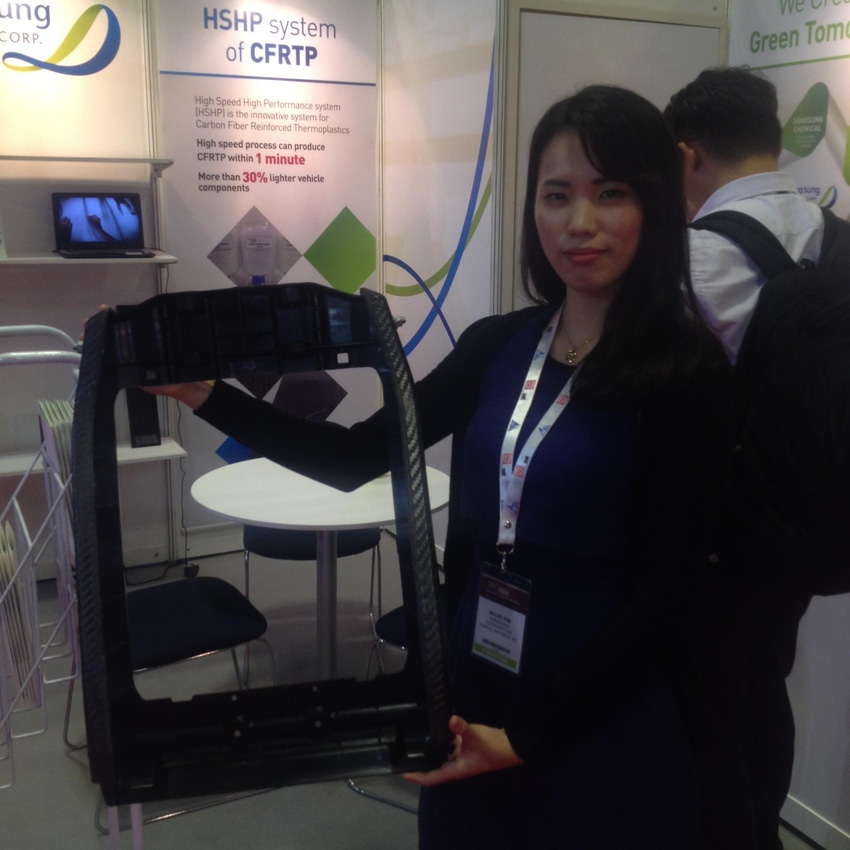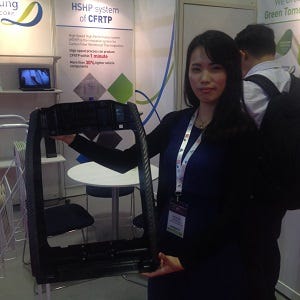The JEC Asia exhibition in Singapore was well attended by Korean companies showcasing their latest carbon fiber composites technology for the automotive sector. Take Dongsung Chemical, for example, which exhibited and delivered a presentation on a long carbon fiber reinforced thermoplastic polyurethane (TPU) seat frame manufactured using a compression molding-injection back molding process.
October 26, 2015

The JEC Asia exhibition in Singapore was well attended by Korean companies showcasing their latest carbon fiber composites technology for the automotive sector. Take Dongsung Chemical, for example, which exhibited and delivered a presentation on a long carbon fiber reinforced thermoplastic polyurethane (TPU) seat frame manufactured using a compression molding-injection back molding process.
Tim Kim, Executive Director of Dongsung Corporate R&D Center says: "TPU is used as the matrix resin in order to impart impact strength to the part." He adds, "three CFR-TPU prepregs are compression-molded in a one-minute cycle prior to back injection molding with polyamide resin." Dongsung is currently working with a Korean Tier 1 to commercialize the technology. The prepregs are formed using a belt process.
 Seat frame uses an interesting combination of long
Seat frame uses an interesting combination of long
carbon fiber and TPU resin to realize rigidity and
impact strength.Korea has a strong composites industry, with local processors supported by local carbon fiber and resin suppliers notes Sung Ha, a professor at Hanyang University, in Seoul and, Head of the institute's Structures and Composites Group. Further, "Automaker Hyundai has invested in a huge research center at the university's Seoul campus to develop composites for automotive.
"High speed production is one of the biggest challenges for the auto industry when it comes to composite materials," says Ha. "Hybrid materials and processes such as combining thermoset and thermoplastics resins, and using injection molding [with other processes] can optimize performance and cost."
In the long term, Ha believes the automobile industry will follow the lead of the aerospace industry and significantly increase the level of composites adoption. "55% of the total mass of the Boeing 787 and the Airbus 380 is composites. A while ago composites usage was less than 5%," he notes.
In other Korean developments at JEC Asia, Hanwha Advanced Materials Group. Combined with Hyundai Motor to develop an aramid fiber-reinforced glass mat thermoplastic prepreg for molding into a bumper beam that weighed 3.5 kg compared with 4.7 kg for an aluminum version.
Korean processor One Kwang Entec (Iksan), meanwhile, has employed carbon fiber braiding and the resin transfer molding (RTM) process to prototype drive shafts and CVT joint assemblies for use in a luxury sedan. The company is working with SsangYong Motor to commercialize the technology.
You May Also Like


